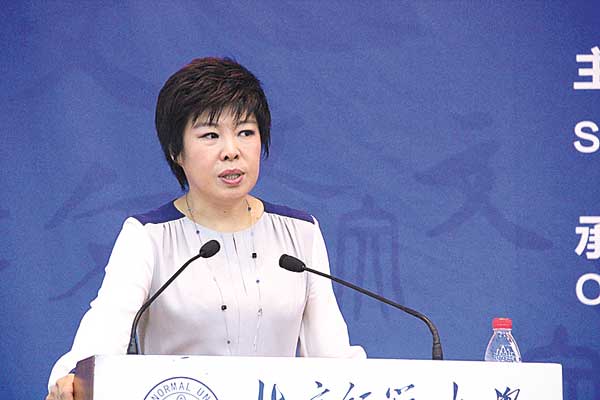

 |
|
Professor Yu Dan hosts the Culture "Going Out" forum in Beijing. Mei Jia / China Daily |
Are the Palace Museum, Peking Opera and Great Wall outdated symbols of Chinese culture when it comes to appealing to an international audience?
Some say yes. But more insist they are not.
As China interacts more with global society, the globalization of the country's culture has become an even hotter topic in academic cultural and communication studies.
Zhao Qizheng, advocator of public diplomacy and former minister of the State Council Information Office, says some Chinese enterprises faced huge challenges when doing business abroad partly because Chinese companies are still struggling to fit into foreign cultures.
"They're inadequate and unskilled in having dialogues with the local religious groups, governments, media and workers' unions," Zhao says at a recent forum titled Culture "Going Out".
The key issues the experts on and off campus are eager to figure out include what are the core cultural values and elements, and what are the dissemination channels.
Organized by Beijing Institute of Culture Innovation and Communication, the forum invites both foreign and Chinese experts from government, business, universities and media to share and exchange views.
Beijing Normal University professor Yu Dan, author of Confucius from the Heart and a TV celebrity, hosts the forum. Yu is also director of the institute.
Founded in 2012, the institute aims at increasing Beijing's cultural appeal internationally.
The institute is not the only academic organization in the country to cater to the rising needs of disseminating Chinese culture to a wider audience outside the country.
Yu's mentor Huang Huilin heads the Academy of International Chinese Culture Communication Research under BNU. The academy started a journal titled International Communication of Chinese Culture with Springer, and conducted a survey on international influence of Chinese films covering 43 languages in 107 countries and collected 108,000 pieces of data.
BNU chairperson Liu Chuansheng says at the forum that the total sum of import and export of cultural products in the country has reached $14.39 billion with a yearly increase of 9 percent, while the number for cultural services has reached $5.7 billion, increasing yearly by 19.5 percent.
But Zhang Jianguo, State Administration of Foreign Experts Affairs director, opines that even though China is the world's second largest economy, Chinese culture is still unable to communicate with the West fully.
"The channels and scale of Chinese culture going global are not on par with the country's abundant culture," he says.
Mei Song, director of Center of Promoting Beijing Cultural and Creative Industry, says the problem lies in China's lack of confidence in its own culture. "We do not understand our culture enough," Mei says.
Alistair Michie, honorary associate of the Needham Research Institute at Cambridge University, believes the problem lies in the gap between the former propaganda style that the Chinese were used to and the more efficient International Reputation Management ideals.
Working as a consultant since the 1980s, Michie sees the importance of changing one-way message into two-way interaction, and turning the Chinese-only team into a combination team of Chinese and foreign experts.
"Telling stories are more powerful than conveying ideas in political or philosophical languages," says Zhao Qizheng, director of the foreign committee of Chinese People's Political Consultative Conference, China's top advisory body.
|
|
|
| Ghost writer | Embracing China |